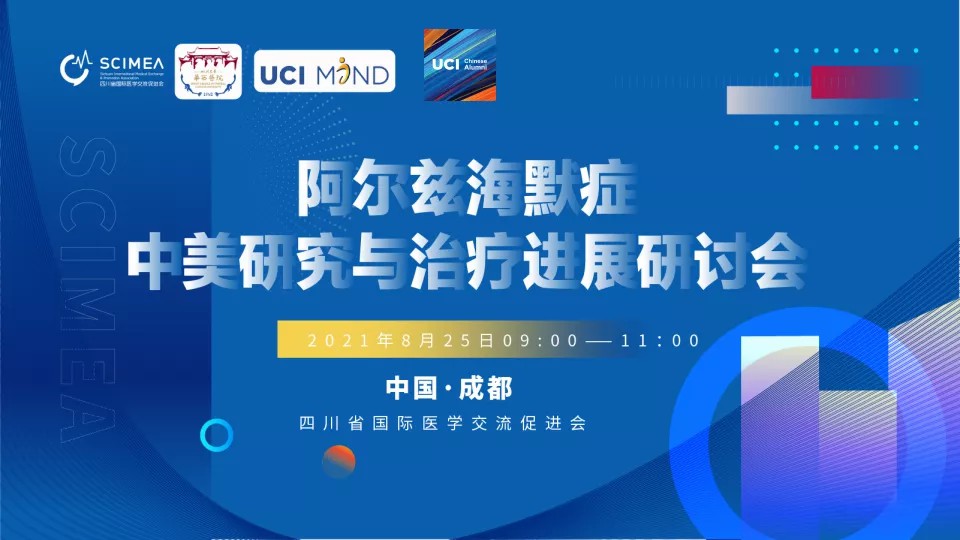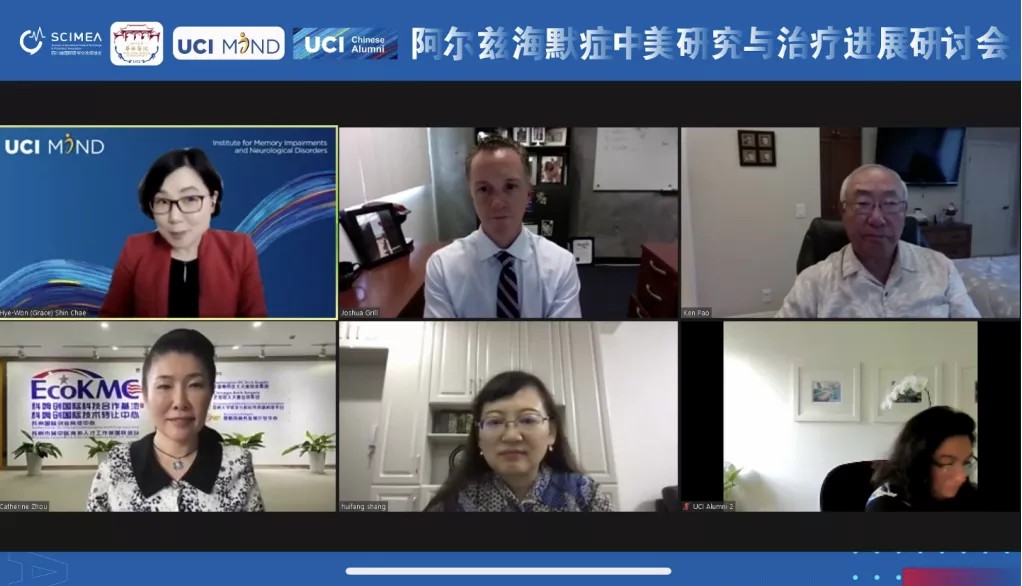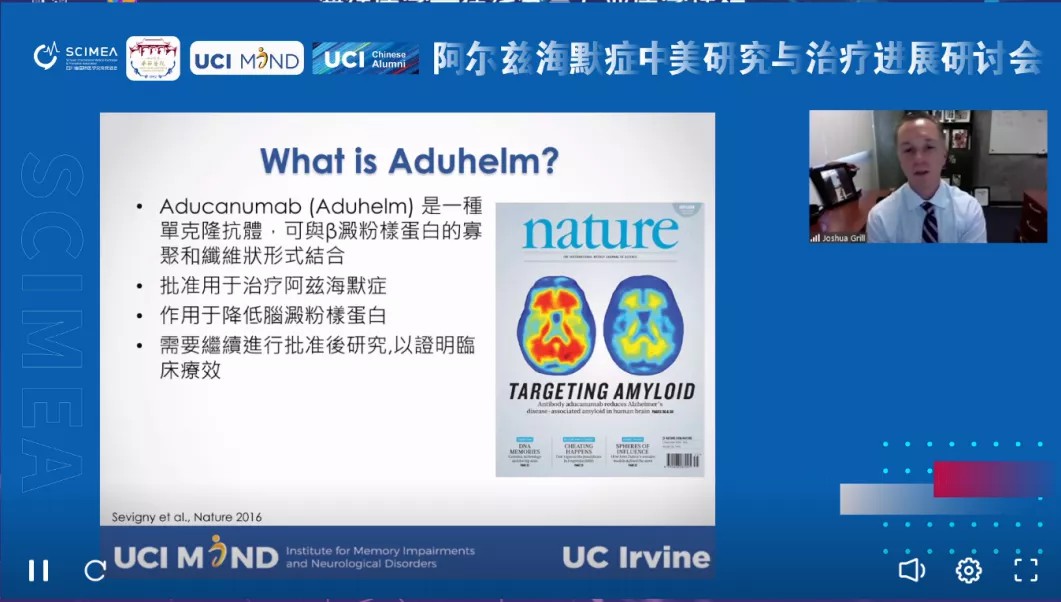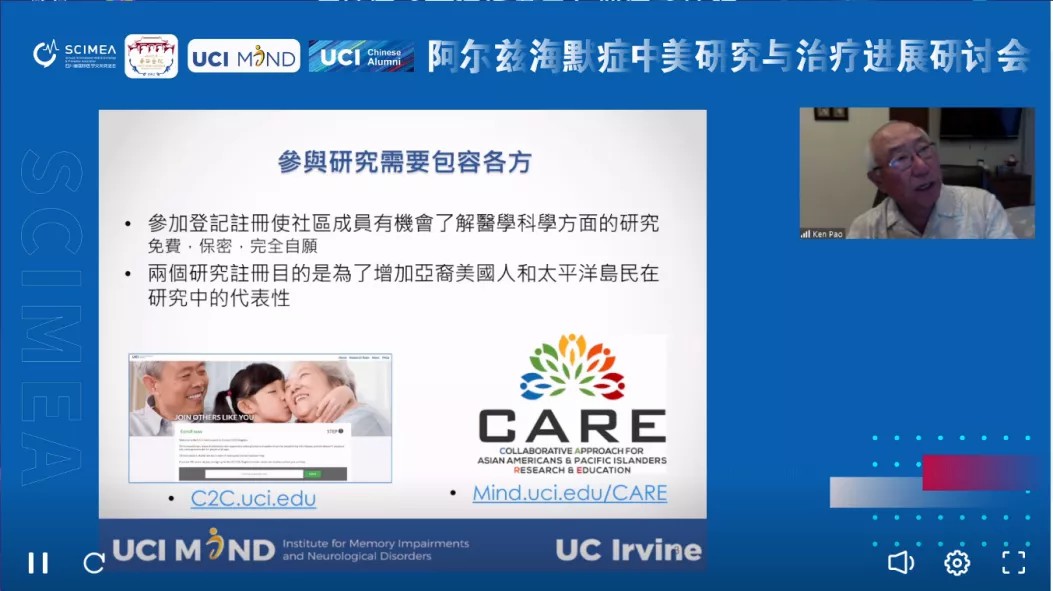International Academic Exchange | Sino-US Symposium on the Advances in Research and Treatment for Alzheimer's Disease Successfully Held

Open the phone and scan
On August 25, 2021, at 9:00 a.m., a symposium on the “Advances in Research and Treatment for Alzheimer's Disease” was successfully held, co-sponsored by Sichuan International Medical Exchange & Promotion Association (SCIMEA), West China Hospital of Sichuan University and the UC Irvine Institute for Memory Impairments and Neurological Disorders (UCI MIND). The symposium was chaired by Dr. Grace Shin, Director of the Asian Community Program at UCI MIND, with Dr. Joshua Grill, Director of UCI MIND, and Dr. Shang Huifang, a professor from Neurology Department of West China Hospital, Sichuan University, as the keynote speakers.

The symposium was held online via ZOOM, and attended by a total of about 1,227 people. Focusing on the latest international advances in the treatment of Alzheimer's disease, the symposium further promoted academic exchanges in the field of Alzheimer's disease treatment between China and the United States, bringing more help and hope to people suffering from this disease worldwide.

In his opening remarks, Dr. Grace Shin, Director of the Asian Community Program at UCI MIND, thanked SCIMEA, West China Hospital of Sichuan University, and UCI MIND for their strong support of the symposium, and hoped that industry experts and medical practitioners would learn from, exchange, and collaborate with each other to improve Alzheimer's medical research through this symposium.
Firstly, Dr. Joshua Grill, Director of UCI MIND, gave a lecture on “Alzheimer's Disease: Advances in Research and Treatment in the United States”. He talked about from three respects, i.e., Alzheimer's disease and dementia, Alzheimer's disease research, Alzheimer's disease treatment. He also explained the impacts of Alzheimer's disease on life, plasma biomarkers and FDA approved treatments for Alzheimer's and other research results.
It is worth mentioning that, Dr. Joshua Grill pointed out Aduhelm is a milestone discovery in current treatment for Alzheimer's disease in the U.S., but there are still many controversies about the drug. In this sense, he encouraged more patients with Alzheimer's disease to participate in the drug research to help reduce their physical and mental burden and live a quality life.


After that, Dr. Shang Huifang, a professor from Neurology Department of West China Hospital, Sichuan University made a detailed report from three directions—Alzheimer's disease in China, introduction to West China Hospital of Sichuan University, and research on cognitive disorders in the Neurology Department, West China Hospital of Sichuan University. Dr. Shang Huifang noted that the public awareness of Alzheimer's disease in China is low, people knows little about the disease, the economic burden of treatment is high, and the efficacy of most Chinese patent medicines and Chinese herb decoctions has not been tested in international randomized controlled trials.
At the same time, she introduced the overall level of West China Hospital of Sichuan University, which, according to her, has been ranked second in the “Best Hospitals in China” for 10 consecutive years, with 28 clinical specialties ranked among the top 10. The Neurology Department of West China Hospital of Sichuan University became a national key clinical specialty in 2021, and currently has 5 wards, 320 odd beds, 60 odd doctors, 200 odd nurses and receives about 300,000 outpatients per year.
Dr. Shang Huifang mentioned that the growing prevalence of Alzheimer's disease is becoming a major public health issue in China, and the cost of treatment of the disease is placing a heavy economic burden on the country, requiring a stronger “anti-dementia strategy” to control the disease, which should include controlling risk factors to reduce the onset of Alzheimer's disease, improving the management of Alzheimer's patients, and increasing public awareness of Alzheimer's disease. Optimizing the management of Alzheimer's disease and mild cognitive impairment is a critical part of China’s public health system.


In addition, there was a lively discussion on “Comparison of Alzheimer's disease treatment, regulations, prevention and lifestyle habits (including diet) between China and the United States” at the symposium, and participants expressed that they had broadened their horizons, strengthened their communication, and gained a clearer understanding of the latest international advances in the treatment of Alzheimer's disease.
During the free exchange session, Dr. Shang Huifang expressed that medical treatment knows no borders and hoped that both sides could have further cooperation in the field of Alzheimer's disease diagnosis and treatment, and looked forward to further academic sharing and progress between the two sides in the near future.


